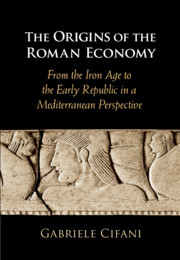 The Origins of the Roman Economy
The Origins of the Roman Economy Book contents
- The Origins of the Roman Economy
- The Origins of the Roman Economy
- Copyright page
- Dedication
- Epigraph
- Contents
- Figures
- Tables
- Acknowledgements
- One Introduction
- Two Notes on the Geographical Context of Early Rome
- Three The Beginnings of a Longue Durée
- Four The Early Iron Age (Latial Phases II and III)
- Five A Settlement Unlike Others
- Six Latial Phase IV (730–580 BC)
- Seven Latial Phase IVA (730–640 BC)
- Eight Latial Phase IVB (640–580 BC)
- Nine The Archaic Phase (580–500 BC)
- Ten Modelling Demography and Consumption
- Eleven Places and Institutions in the Archaic Roman Economy
- Twelve The Economics of the Early Calendar
- Thirteen The Early Latins Overseas
- Fourteen The Fifth Century BC
- Fifteen Crisis and Opportunities in the Fifth Century BC
- Sixteen The Fourth Century BC
- Seventeen Fourth-Century Transformations and the End of the Archaic Economy
- Eighteen Epilogue
- Book part
- Notes
- Bibliography
- Index
Two - Notes on the Geographical Context of Early Rome
Published online by Cambridge University Press: 18 February 2021
- The Origins of the Roman Economy
- The Origins of the Roman Economy
- Copyright page
- Dedication
- Epigraph
- Contents
- Figures
- Tables
- Acknowledgements
- One Introduction
- Two Notes on the Geographical Context of Early Rome
- Three The Beginnings of a Longue Durée
- Four The Early Iron Age (Latial Phases II and III)
- Five A Settlement Unlike Others
- Six Latial Phase IV (730–580 BC)
- Seven Latial Phase IVA (730–640 BC)
- Eight Latial Phase IVB (640–580 BC)
- Nine The Archaic Phase (580–500 BC)
- Ten Modelling Demography and Consumption
- Eleven Places and Institutions in the Archaic Roman Economy
- Twelve The Economics of the Early Calendar
- Thirteen The Early Latins Overseas
- Fourteen The Fifth Century BC
- Fifteen Crisis and Opportunities in the Fifth Century BC
- Sixteen The Fourth Century BC
- Seventeen Fourth-Century Transformations and the End of the Archaic Economy
- Eighteen Epilogue
- Book part
- Notes
- Bibliography
- Index
Summary
Natural resources and geographic position are not of value in themselves, but become so when exploited according to the political and economic inputs of each historical phase. Natural harbours, mineral deposits, pasture and agricultural land play different roles, on the basis of the willingness and possibilities of local communities to engage in exploitation and trade.
- Type
- Chapter
- Information
- The Origins of the Roman EconomyFrom the Iron Age to the Early Republic in a Mediterranean Perspective, pp. 15 - 23Publisher: Cambridge University PressPrint publication year: 2020


